Sports
/ArcaMax
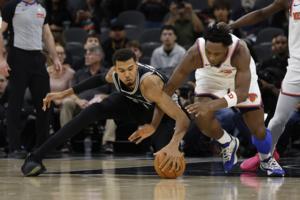
Knicks blow 19-point lead in New Year's Eve loss to Spurs
If you beat the team that beat the team, does that make you the team to beat?
The Knicks were about to find out. And then they blew it.
After all, the San Antonio Spurs have had the reigning champion Oklahoma City Thunder’s number. They’ve defeated the 2025 NBA champs not one, not two, but three times this season, including a 20-point ...Read more
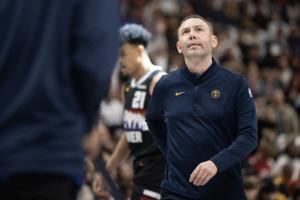
Brandon Ingram's buzzer beater called off as Nuggets survive Raptors without Nikola Jokic
TORONTO — The new year couldn’t arrive soon enough for the Nuggets.
Already down four starters, including three-time NBA MVP Nikola Jokic, they were hanging on for dear life with a third-quarter lead over the Raptors on Wednesday night. Then, as the final hours of 2025 ticked away, one more cursed injury struck. Jonas Valanciunas abruptly ...Read more

No. 4 UConn men's basketball closes 2025 with dominant 90-67 win at Xavier
The fourth-ranked UConn men’s basketball team closed 2025 in dominant fashion as it rolled to its ninth consecutive victory with an 90-67 win over Xavier in Cincinnati’s Cintas Center Wednesday night.
The Huskies (13-1, 3-0 Big East) had four players in double figures, led by redshirt-senior captain Alex Karaban, who finished with 19 points...Read more

No. 6 Duke basketball holds off Georgia Tech, in an unusual way, in ACC opener
DURHAM, N.C. — Duke was in the zone Wednesday as the No. 6 Blue Devils opened ACC play against Georgia Tech at Cameron Indoor Stadium.
The Blue Devils came away with a hard-fought 85-79 victory, but only after finally slowing the Yellow Jackets’ shooters with something unexpected — a zone with 1-2-2 and 3-2 looks.
Freshman Cameron Boozer...Read more
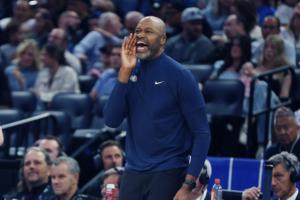
Paolo Banchero lifts Magic past Pacers in Jalen Suggs' return
Entering Wednesday’s game between the Magic and Pacers, Orlando coach Jamahl Mosley wanted his team to rebound the ball better and limit Indiana’s fast-break chances — two statistical categories that helped the Raptors take down Orlando two days prior.
Although the Magic allowed 15 fast-break points (half as many as they gave up at ...Read more
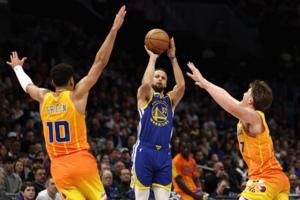
Steph Curry leads Warriors to victory vs. hometown Hornets in New Year's Eve matinee
CHARLOTTE, N.C. — A glance through the stands at Spectrum Center on Wednesday could have left a deceptive impression. If the average paying customer was not wearing a blue-and-gold “Curry” Warriors jersey, they were either decked out in a red “Curry” Davidson outfit or perhaps white “Curry” USA garb.
The host Hornets? Barely an ...Read more
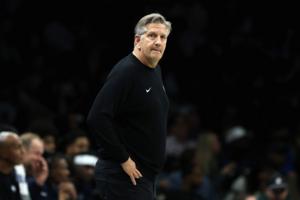
Timberwolves lay an egg on New Year's Eve and fall to Hawks, 126-102
ATLANTA — With the Timberwolves down 29 with 7 minutes, 52 seconds left in the fourth quarter in their game Wednesday against the Hawks, Anthony Edwards threw his towel up in the air during a timeout huddle and left the floor.
Coach Chris Finch had decided to empty his bench toward the end of the Wolves’ most embarrassing effort of the ...Read more
Pistons end five-game road trip with blowout win vs. Lakers
The Detroit Pistons closed their five-game West Coast road trip in a 128-106 victory over the Los Angeles Lakers on Tuesday night at Crypto.com Arena. The Pistons improved to 25-8 overall while finishing their road trip at 3-2.
Cade Cunningham led the Pistons with 27 points on 12-of-19 shooting, while adding 11 assists. He was one of only two ...Read more

Derrick White's record-setting block party helps power Celtics past Jazz
The bad: Derrick White attempted 10 3-pointers in Tuesday’s matchup with the Jazz and made just two of them.
The good: just about everything else about the Celtics guard’s latest outing.
White finished with 27 points, seven rebounds, six assists and a staggering seven blocks as Boston beat Utah 129-119 at the Delta Center, becoming the ...Read more
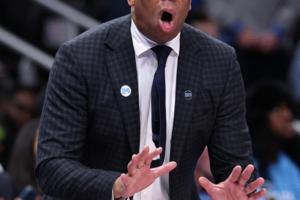
Caleb Wilson stuffs the stat sheet as UNC rolls past FSU to open ACC play
CHAPEL HILL, N.C. — When Caleb Wilson earned an offensive rebound and put-back about seven minutes into No. 12 North Carolina’s game against Florida State on Tuesday night, it brought a good portion of the Dean E. Smith Center crowd to its feet.
The play wasn’t anything overtly flashy. Yes, there was the trademark display of Wilson’s ...Read more
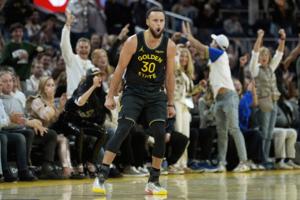
Why Steph Curry is primed for New Year's Eve explosion against hometown Hornets
CHARLOTTE, N.C. — It is a scene witnessed in almost every NBA city the Warriors visit: fans arriving hours before tipoff and congregating in the lower bowl to gawk at Steph Curry’s legendary shooting routine before begging him for a signature or picture.
Curry almost always obliges, but it may be difficult for him to accommodate all ...Read more
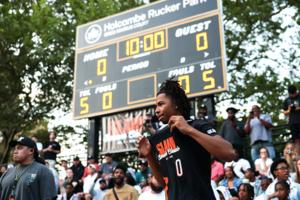
Deron Rippey, top-rated point guard in Class of 2026, commits to Duke
Duke has won the basketball recruiting battle for Deron Rippey Jr., the top-rated point guard in the Class of 2026.
Rippey, listed at 6-foot-2, was pursued by nearly every top basketball program in the country, including North Carolina and Kentucky. He narrowed his list to five schools: Duke, N.C. State, Texas, Tennessee and Miami.
“The (...Read more
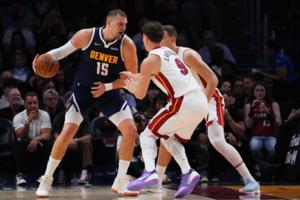
Nuggets star Nikola Jokic out 4 weeks with left knee hyperextension but avoids ACL injury
DENVER — An MRI gave the Nuggets the best bad news of the year.
Nikola Jokic will miss at least four weeks while recovering from a hyperextended left knee, the team announced Tuesday, but his ACL was spared in an ominous-looking injury Monday night. Testing on Tuesday revealed no ligament damage that would entail season-ending surgery.
The ...Read more
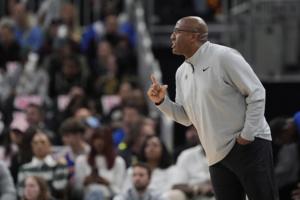
Kristian Winfield: Knicks' young players shine in 130-125 victory over Pelicans
Those second-round picks are growing in in-house value with a head coach more willing to put young players on the floor.
It’s been one of the biggest takeaways in recent games the injury-stricken Knicks have faced, including their 130-125 victory over the New Orleans Pelicans at the Smoothie King Center on Monday. Miles McBride made his ...Read more

Warriors bench comes up huge down stretch in win over Nets
Will Richard drove his hands right into the fray late in the fourth quarter as two Nets lay on their back with the ball near midcourt of the Barclay’s Center. The rookie from Florida ripped the ball away and dribbled toward a completely unguarded basket.
But instead of scoring the two easiest points of his young career, he dished off to ...Read more

Adebayo returns in Heat's 147-123 victory vs. Nuggets, as Jokic goes down
MIAMI — For years, the Miami Heat have been struggling to find a way against the Denver Nuggets.
Entering Monday night’s matchup at Kaseya Center, the Heat had lost 11 consecutive regular-season games to the Nuggets, as well as six consecutive home games to Denver.
And then the Heat found their way, with a 147-123 decision ... against what...Read more

Magic collapse late in loss at Raptors
Facing a team that was playing on the second night of a back-to-back such as the Raptors on Monday night, the Magic had a chance to earn a quality win on the road in a contest between the No. 4 and No. 5 teams in the NBA‘s Eastern Conference.
Orlando failed to take advantage of the opportunity, falling, 107-106, inside Scotiabank Arena in ...Read more

Naz Reid scores 33 points off the bench as Timberwolves waltz past Bulls
CHICAGO — As the Timberwolves have trudged through the first two-plus months of the season, they have often played better basketball in second halves than first, especially against opponents they should beat.
Rarely does the burst of energy come in the second quarter, which is when the Wolves first showed up in what became an easy 136-101 ...Read more

Michigan closes out year with 112-71 romp over McNeese State
ANN ARBOR, Mich. — The Wolverines closed out the 2025 portion of their schedule with a bang.
Another 100-point game. Another dominant performance. Another rout in front of a packed home crowd.
With the frontcourt trio of Morez Johnson Jr., Yaxel Lendeborg and Aday Mara leading the way, second-ranked Michigan overwhelmed McNeese State on ...Read more

Nuggets star Nikola Jokic suffers knee injury, leaves game vs. Heat
Nikola Jokic limped to the locker room after injuring his left knee three seconds before halftime of the Nuggets’ game in Miami on Monday night.
Jokic’s left leg extended then buckled after the right foot of Denver’s Spencer Jones landed on his left foot during a defensive possession. In a nightmare visual for every Denver sports fan, ...Read more
Popular Stories
- Pistons end five-game road trip with blowout win vs. Lakers
- Why Steph Curry is primed for New Year's Eve explosion against hometown Hornets
- Derrick White's record-setting block party helps power Celtics past Jazz
- Steph Curry leads Warriors to victory vs. hometown Hornets in New Year's Eve matinee
- Deron Rippey, top-rated point guard in Class of 2026, commits to Duke





